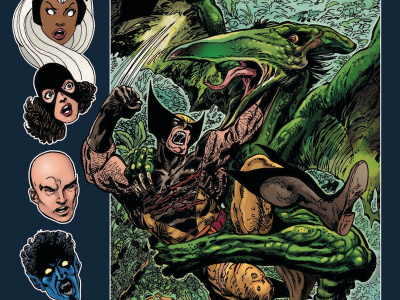A couple of weeks ago, we published a story on Marvel's new hardcover program for 2002 (see 'Marvel To Launch Hardcover Program'). We immediately heard from retailers on both sides of the issue ('Retailer Reaction to Marvel's Hardcover Program -- He Doesn't Like It' for comments from Ilan Strasser of Fat Moose Comics and Games, and '...--She Likes It' for a response from to Strasser from Tricia Hovorka of TalesofWonder.com). Strasser of Fat Moose sent in this response to her:
After reading Tricia's response to my comments about Marvel's hardcover pricing policies, I felt that some further discussion was warranted. Tricia made several valid points in response to issues I didn't raise. The fact she raised them in no way minimizes what she said. She was right to point out that Marvel's hardcover pricing is competitive with other offerings published by other companies and that in general, Marvel offers a good value with their hardcovers. However, some of her other comments point to an (understandable) bias on her part, based on the fact that her company sells through the Internet only.
First, in citing the theory of yield management in determining price points, she erroneously compares the pricing of the Origin hardcover with the inflated prices some retailers are charging for the single issue of Origin #1. The price increase on the single issue book occurred only after it sold out almost immediately upon release, and it became evident to those seeking it out that they would not be able to find a copy of the book without extreme difficulty. The Origin hardcover is being solicited at an inflated price, relative to production costs, as a new item available for the first time. These are extremely different situations.
One should keep in mind that had Marvel allowed reorders on such a hot project, not only would more consumers have been able to get the first issue, but orders for subsequent issues would have been much higher as those same consumers would have had a reason to seek out the rest of the series. Retailers also would have felt safer taking additional risks in terms of their initial orders for these later issues. However, Marvel had a vested interest beyond following their inflexible no-reprint policy on the book - had more people been able to obtain the series in regular form, demand for the overpriced hardcover would have been substantially less.
Secondly, Marvel can push out as many trades as it wants. But offering five to ten new trades a month is oversaturation. To protect the financial viability of its retailers, and to give consumers a chance to make discrete purchasing choices over time, the number of releases should be minimized. At the very least, Marvel should wait at least 6 months after a series ends before soliciting a reprint trade. This is something DC almost always does. Not many of my customers can buy their new weekly comics and 2 or 3 trades every week. Many customers choose to forego one or the other in an effort to not decimate their monthly budget. If Marvel wants to produce so much new hardcover and paperback material, it should exclusively focus, at least at first, on older, long out of print material. I do commend Marvel for restarting its Masterworks program and its continuation of the Essential line.
I would be surpised if TalesofWonder.com didn't support a hyper-increase in trade and hardcover offerings from Marvel, since that is all they sell from their Website. Those of us who, for better or worse, also try to stock and sell action figures, statues and mini-busts, customizable card games, sports cards, etc, etc, find the introduction of so many new trades and hardcovers every month to be a very expensive proposition. And I'm not picking on Marvel here - DC is putting out a few too many new offerings each month also.
The reason the DC Archives line is the best selling line of hardcovers, in spite of the $49.95 price per book, is because the individual books are perceived as being part of a collective history of the company. In that way, they seem thematically related and the page counts are relatively close from one volume to another. Not so with the incredible disparity in pages between the Origin and Ultimate Spider-Man hardcovers.







